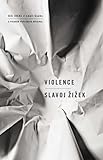I just finished Slavoj Zizek's Violence and am wondering where it fits into my thinking war and peace in the global village.
Zizek argues that the correct response to violence is to "learn, learn, learn;" he thinks that language, which is often seen as the medium of reconciliation, is actually the medium of division and conflict (he surprisingly doesn't deal with the Tower of Babel); he thinks that academics put on a good show but don't actually do much, he thinks that "liberal communists" like Bill Gates provide aid with one hand, but only after they have reaped the benefits of the global capital oppressive system on the other hand. He also believes that violence, struggle, revolt are, in some cases, necessary.
As an educator and specifically a professor of "language," I could probably work with Zizek's notion of "learn, learn, learn," but interestingly, both the students in this class (WPGV 2008) and I feel compelled to act, to get out of the classroom rather than just learn, read, propose, etc.. Educators, as many commentators have noticed, are in the awkward position of having to defend learning for learning's sake these days.
I'm trying to figure out, though, where Zizek rubs up against some of the other following people:
1. McLuhan: violence is a quest for identity.
2. Lynn Worsham: we have not brought emotion into pedagogy despite the violence and emotional upheaval of our culture.
3. Letters for the Living: a book about letting students write about the violence in their lives, as well as seek the moments and places of peace in their lives.
4. The Violence of Literacy: a book I need to read ASAP.
What I also need to figure out are the problems / questions I want to address. What do I need to know and think about violence to be a teacher of language? What do I want students to know and think about the violence of language and literacy? This second question might be the key, a question relevant to general composition courses, writing in the health professions, visual culture and language.
Monday, December 29, 2008
Saturday, December 27, 2008
Here Comes Everybody: The final evaluation
 Here Comes Everybody: The Power of Organizing Without Organizations by Clay Shirky
Here Comes Everybody: The Power of Organizing Without Organizations by Clay ShirkyMy review
rating: 3 of 5 stars
Okay book, but I keep looking for him to acknowledge and work with the Joyce reference in the title ("Here Comes Everybody" is the "hero" of Finnegan's Wake), and / or acknowledge the McLuhan influences that show up everywhere. The curse of being an academic--I am interested in the connections!
He does a nice job with technological determinism: he points out that the printing press didn't initiate the renaissance, but it significantly furthered it. He does a nice job of explaining why he thinks people contribute to Wikipedia, and he shows through a couple of different examples that social media sites rely on a few people to do a lot of work and many people to do a little work--good reminder for me every time I try to initiate a social media project that gets minimal buy-in.
Hhmmm, maybe I am liking the book more than I realized! Better keep going.
Dec. 28, 2008 Update.
I finished this book a while back; might try to use it in my electronic communication class. Definitely trying to apply some of his principles to my "organization without organization" http://africansoulamericanhear....
View all my reviews.
Zizek: Violence
 Violence: Six Sideways Reflections by Slavoj Zizek
Violence: Six Sideways Reflections by Slavoj ZizekMy review
rating: 3 of 5 stars
Finally finished Zizek's Violence after having started it late summer or fall. Zizek offers the provocative arguments that instead of acting in response to global crises and violence, we need to "learn, learn, learn" and not perpetuate "our" academic activism of dialogue and critical inquiry. Seems a little contradictory that he supports learn, learn, learn but not dialogue. That said, I do continue to find Zizek compelling and interesting, a leftist McLuhan, a joker, but each joke a serious stab at dogmatic slumberers and liberals.
View all my reviews.
The Middle of Everywhere: Good Reads comments
 The Middle of Everywhere: Helping Refugees Enter the American Community by Mary Pipher
The Middle of Everywhere: Helping Refugees Enter the American Community by Mary PipherMy review
rating: 5 of 5 stars
Fascinating book; heart-breaking stories; need to keep reading but wanted to see what others have said.
Dec. 28, 2008 update.
I finished this book back in August but forgot to update my thoughts. I enjoyed the broad view, but am thinking about a book that might follow three refugee families I know in more detail. Pipher gets at many of the challenges refugees face, but I am stunned by how so many small thing can make life precarious for those resettled to the US and other countries.
View all my reviews.
Friday, December 05, 2008
Library Project Money Bomb!
A Library Project for Southern Sudan is dropping a money bomb on Dec. 14; please visit their site and donate what you can. But first, check out their video.
Thursday, December 04, 2008
Subscribe to:
Comments (Atom)